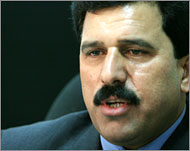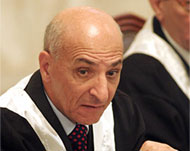Saddam says he is on hunger strike
Saddam Hussein, the former Iraqi president, has announced in court that he and his co-defendants are on hunger strike to protest at tough stances by the chief judge in a heated start to the latest session of his trial.

Saddam shouted his support for the Iraqi anti-US fighters, yelling “Long live the Arab nation” and “Long live the mujahidin,” as he entered the courtroom and immediately began a heated exchange with Rauf Abdel Rahman, the chief judge, on Tuesday.
“For three days we have been holding a hunger strike protesting against your way in treating us – against you and your masters,” Saddam told Abdel Rahman, who in Monday’s session ordered the eight defendants to attend the court despite a boycott by their original defence team.
Taha Yassin Ramadan, former vice-president, shouted: “You kick out our lawyers, you bring in witnesses by force and those that testify against us are anonymous – is there a trial like this anywhere else in the world?”
As the judge pounded his gavel to restore order, Saddam told him to “take that hammer and knock yourself on the head”.
The trial was adjourned until 28 February.
Forced to return
Saddam has said he was forced to return to court on Monday, breaking a two-day boycott of hearings in a trial that has been troubled since it began on 19 October.
But he showed his trademark defiance.
“I say to all Iraqis: Fight and liberate your country,” said Saddam.
After further arguments, the judge finally called the first witness, an anonymous former member of the intelligence services who testifed from behind a screen.
 |
|
Khalil al-Dulaimi says his client |
Khalil al-Dulaimi, Saddam’s lead defence lawyer, who together with the rest of the defence team is boycotting the hearings, called the trial a farce and said his client was tricked into appearing in court on Monday.
One witness said he was forced to appear in court, echoing remarks made by other former Saddam aides on Monday.
Such comments have reinforced some views that Saddam, who is charged with crimes against humanity, cannot receive a fair trial in a chaotic court in Iraq, where sectarian strife is rising and his supporters are leading an insurgency.
The trial has been marred by heated verbal exchanges, the resignation of the first chief judge and the killing of two defence lawyers.
Former aides
Saddam’s former aides have been appearing in court to testify amid tests of will with the judge, a Kurd from the village of Halabja, which Saddam is accused of gassing in 1988.
 |
|
Judge Abdel Rahman’s relatives |
Some of Abdel Rahman’s relatives were killed in the attack.
Prosecutors are pinning their hopes on former aides to help establish a direct link between Saddam and the killing and torture they say his men committed.
But several have said they were forced to testify.
Fadhil al-Azzawi, who identified himself as a diplomat who retired in 1996 and said he was an ambassador to the Soviet Union in 1982, made the same accusation.
He told the court: “I reject being a witness in this case because I do not have information … I was forced to come to court.”
Saddam and his co-accused are charged with the killing of 148 men from the mostly Shia town of Dujail in reprisal for an attempt to assassinate Saddam there in 1982.
Prosecutors had hoped the Dujail case would be clear cut and easier to prove than bigger ones that involve charges of genocide and may be more difficult to tie to Saddam.
Document evidence
|
“I reject being a witness in this case because I do not have information … I was forced to come to court” Fadhil al-Azzawi, |
On Tuesday, the chief prosecutor presented a document he said was sent from the head of the intelligence agency to the senior leadership in Saddam’s Revolutionary Command Council.
The letter suggests that six people should be rewarded for helping in the capture of “members of the agent Dawa party in the Dujail area”, referring to outlawed Shia rebels accused of trying to kill Saddam.
A witness said a signature at the bottom of the document “seems to be that of the president”.
Prosecutors hope such document trails will lead to the maximum penalty of hanging.
But testimony and documents have been overshadowed by the thunderous voice of a former leader who still thinks nobody has the right to question him.